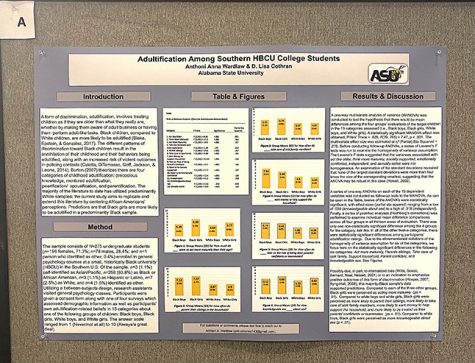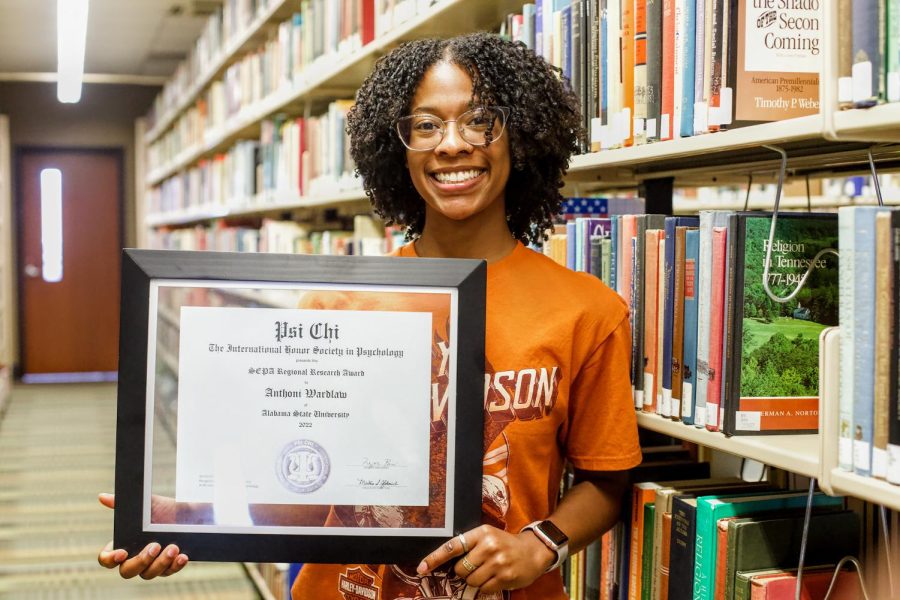Wardlaw receives regional research award
Senior Anthoni Anna Wardlaw smiles radiantly as she displays her SEPA Regional Research Award that was given to her by the International Honor Society in Psychology during a recent trip to South Carolina, where she presented her research of four years.
April 2, 2022
Anthoni Anna Wardlaw, an academic scholar at Alabama State University, was honored with the Southeastern Psychological Association (SEPA) Regional Research Award by Psi Chi The International Honor Society in Psychology on March 24, 2022.
This is the first time a Hornet has won both a research grant and a research award for her outstanding presentation at a conference.
Wardlaw, a senior, psychology-pre-med major, did her research on the views of adultification, titled ‘Adultification Among Southern HBCU Students.’ Her research project was developed from a larger research study in a class taught by professor Lisa Cothran, Ph.D. Cothran spoke highly of Wardlaw throughout the process.
“I would easily consider Anthoni to be among the top 5% of the students I have taught and mentored in the past 18 years. She is intelligent, driven, socially-conscious, has a great work ethic, and has a great sense of humor! Her future is incredibly bright,’’ Cothran said.
Cothran went on to describe her feelings about Wardlaw’s tremendous achievements saying it was “gratifying to see her shine so brightly.” The two have been working together since 2019, with Wardlaw serving as her research assistant.
Wardlaw expressed the importance of the research saying previous literature focused on “majority white samples” as opposed to Black samples. “We know what other races think when they see young, Black girls, but my question is, ‘Do we as Black people look at ourselves and our children, especially Black girls, and adultify them – meaning do we treat our young, Black babies as if they are older than their given age,’” Wardlaw said. In order to change this narrative, she collected data from 275 participants enrolled in a general psychology course. Of all the participants, 93.8% identified as African American and 196 identified as female. Results indicated that African Americans tend to adultify Black children, especially Black girls, just as other races do.
Wardlaw detailed the results.
“Results show that Black girls are perc

eievd as acting more maturely, more likely to parent their siblings, more likely to take care of sick family members, more likely to earn money to support the household, more likely to be treated as their parents’ confidant or teammates, and perceived as more knowledgeable about sex.”
She describes the results as “shocking” and “a little emotional at times,” because it indicated how Black people can view themselves and their children in the same negative way the rest of the world does; as if the color of one’s skin automatically means he or she is to take on adult-like tasks at a early age. When she was presenting her research, there were many white research students her age who read her poster and appeared to be “very intrigued by it.”
One white presenter in particular came up to Wardlaw and slightly touched her arm saying, “Thank you so much for doing this. I feel like this is really drawing attention to a topic that is not widely discussed, and needs to be more understood by people.”
That is the hope for Wardlaw as well. She believes if people understand the term adultification, they can think about it in their own lives and in the lives of their children.
Despite doing the research, Wardlaw does not have a clear solution, believing that the world is still constantly “changing.” She compares the current generation with the previous ones. This upcoming generation may be much different from hers. Due to those differences, they may have a different perception of adultification.
“I do not know what their main values are and what they perceive to be important, other than the fact they do not appreciate being wrongly identified. I do not know how that works in terms of adultification, because while some may be more mindful of it, others may believe having certain responsibilities at young age helps you prepare for the future as you get older,” Wardlaw said.
She sees the dilemma that parents can face when dealing with the issue of adultifying their children.
“You do not want a child to grow up too soon, but at the same time, you want to make sure they learn certain responsibilities and how to take care of themselves whenever the time comes,” Wardlaw said.
According to Cothran, Wardlaw’s research has “helped to establish something crucial in literature,” bringing attention to the extent of discrimination and adultification of Black children, especially in comparison to white children. She went onto explain how “this current research is helping to understand how being victimized in this way as a child may have a tendency to manifest itself later in adulthood.”
The two are currently working on getting Wardlaw’s article published in the Psi Chi Journal of Psychological Research, so that it can reach more people.
Wardlaw, being a Black woman giving insight on a topic composed of mostly Black women, adds even more weight to her work. Cothran describes this feat as “rare” and “commendable.”
Wardlaw felt this experience was crucial in her development in the field of psychology. She understands that she will be expected to do more in the future and having this achievement and experience will better prepare her.
In the future, she plans to go to medical school to be a psychiatrist and/or a cardiothoracic surgeon.
As far as her research goes, Wardlaw has an answer that describes her perfectly.
“I definitely do not plan on ending this research or any of my research in the future. Being at the conference and listening to other presentations, I formulated numerous research questions that I feel compelled to find answers to. That is really what psychology is about, having questions and doing what it takes to find answers.”








